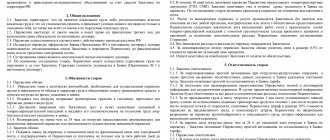The concept of administrative responsibility, its characteristics
Administrative responsibility is the obligation of an individual or legal entity to undergo measures of state coercion provided for by the Code of Administrative Offenses of the Russian Federation or the laws of the constituent entities of the Russian Federation for committing an unlawful guilty act (inaction) (administrative offense).
Administrative responsibility is characterized by the following features:
- It can be provided not only by federal legislation, but also by the laws of constituent entities of the Russian Federation;
- Committed for an administrative offense;
- Relies on state coercion;
- Subjects of administrative liability can be both individuals and legal entities;
- Administrative punishment as a measure of administrative responsibility can be imposed by a wide range of authorized entities.
Grounds for bringing to administrative responsibility
Parts 1 - 1.3 Art. 28.1 of the Code of Administrative Offenses of the Russian Federation contain a list of reasons for initiating a case of an administrative offense:
- direct detection by officials authorized to draw up protocols on administrative offenses;
- messages from individuals and legal entities, state and municipal bodies;
- recording with special technical video surveillance equipment.
In accordance with Part 1 of Art. 28.2 of the Code of Administrative Offenses of the Russian Federation, a protocol is drawn up on the commission of an administrative offense, with the exception of certain cases provided for by the Code of Administrative Offenses of the Russian Federation.
Protocol of administrative offense
A protocol is drawn up immediately after an administrative offense has been detected. If additional clarification of the circumstances of the case or information about an individual or information about a legal entity is required in respect of which a case of an administrative offense is being initiated, a protocol on the administrative offense is drawn up within two days from the moment the administrative offense is discovered.
In some cases specified in Art. 28.7 of the Code of Administrative Offenses of the Russian Federation, an administrative investigation is underway. In the case of an administrative investigation, a protocol on the administrative offense is drawn up upon its completion.
Next, the protocol on the administrative offense is sent to the judge, body, official authorized to consider the case of an administrative offense, within three days from the date of drawing up the protocol (Part 1 of Article 28.8 of the Code of Administrative Offenses of the Russian Federation).
The basis for bringing to administrative liability is the commission by a person of an administrative offense - an unlawful, guilty action (inaction) of an individual or legal entity, for which administrative liability is established by the Code of Administrative Offenses of the Russian Federation or the laws of the constituent entities of the Russian Federation on administrative offenses.
The corpus delicti of an administrative offense should be understood as a set of characteristics, in the presence of which a specific act is an administrative offense.
The elements of an administrative offense are:
1. object of an administrative offense (protected social relations);
2. the objective side of an administrative offense (the method of commission, place, time, for example, violation of traffic rules by drivers (Chapter 12 of the Code of Administrative Offenses of the Russian Federation) can be expressed in various actions: speeding, failure to comply with road signs);
3. subject of an administrative offense;
4. the subjective side of an administrative offense (guilt is required).
Generic object of the offense
According to the Code of Administrative Offenses of the Russian Federation, the generic object of the offense includes the types of life activities of citizens and the activities of legal entities in the area:
- protection of the rights and legitimate interests of citizens and society (Chapters 5, 6);
- protection of all types of property, for example private, state and municipal (Chapter 7);
- environmental protection and natural resource management (chapter 8);
- industry, construction and energy (chapter 9);
- agriculture, veterinary medicine and land reclamation (chapter 10);
- transport (chapter 11);
- traffic (chapter 12);
- communications and information (chapter 13);
- entrepreneurial activity (chapter 14);
- finance, taxes and fees, securities market (chapter 15);
- customs affairs (violations of customs rules) (Chapter 16);
- encroachments on institutions of state power, public order and public safety (Chapters 17, 19, 20);
- protecting the State Border of the Russian Federation and ensuring the regime of stay of foreign citizens or stateless persons on the territory of the Russian Federation (Chapter 18);
- military registration (chapter 21).
In addition to general subjects of administrative offenses (individuals, legal entities), there are also special ones (officials, drivers, military personnel).
Resolution on a case of an administrative offense
Based on the results of the consideration of the case of an administrative offense, either a resolution is issued to impose an administrative penalty or a resolution to terminate the proceedings in the case of an administrative offense (Article 29.9 of the Code of Administrative Offenses of the Russian Federation).
Requirements for the content of a resolution on an administrative offense are contained in Article 29.10 of the Code of Administrative Offenses of the Russian Federation.
Who reviews cases of administrative offenses and makes decisions?
The authorities consider cases and make decisions on administrative offenses (for example, internal affairs bodies (police), customs authorities, export control authorities, border authorities, military commissariats, etc.; see Articles 23.2 - 23.84 of the Code of Administrative Offenses of the Russian Federation) and judges (Article 23.1 of the Code of Administrative Offenses of the Russian Federation).
If during the consideration of the case it turns out that the case is not subject to consideration by this body, official or judge?
In this case, on the basis of Part 2 of Article 29.9 of the Code of Administrative Offenses of the Russian Federation, a determination is made:
1) to transfer the case to a judge, body, official authorized to impose administrative penalties of a different type or amount or apply other measures of influence in accordance with the legislation of the Russian Federation;
2) on transferring the case for consideration according to jurisdiction, if it is found that the consideration of the case does not fall within the competence of the judge, body, or official who examined it.
If a case of an administrative offense was considered by an unauthorized official, body or judge, was a decision made?
In this case, upon a complaint from a person brought to administrative responsibility, the decision made by an unauthorized person (or court) is subject to cancellation.
At the same time, the proceedings in the case of an administrative offense are subject to termination on the basis of paragraph 6 of Part 1 of Art. 24.5 of the Code of the Russian Federation on Administrative Offences, in the event that the two-month statute of limitations for bringing to administrative responsibility, provided for in Part 1 of Art. 4.5 of the Code of Administrative Offenses of the Russian Federation (or another statute of limitations provided for in Article 4.5 of the Code of Administrative Offenses of the Russian Federation), since the expiration of this period prevents the case from being sent for a new consideration.
If the statute of limitations for bringing to administrative responsibility has not expired, the appealed decision is subject to cancellation, and the case of an administrative offense is sent for consideration to an authorized official, body, or judge of jurisdiction (Article 30.7 of the Code of Administrative Offenses of the Russian Federation).
Evidence in the case of an administrative offense
The judge, body, official considering a case of an administrative offense must establish the presence or absence of an administrative offense event, the guilt of the person brought to administrative responsibility.
The evidence in the case of an administrative offense, according to Article 26.2 of the Code of Administrative Offenses of the Russian Federation, is:
— protocol on administrative violation; — other protocols provided for by the Code of Administrative Offenses of the Russian Federation; — explanations of the person against whom proceedings are being conducted for an administrative offense; - testimony of the victim; - testimony of witnesses; — expert opinions; — indications of special technical means; — material evidence; - other documents.
When a protocol on an administrative offense is not drawn up, but a decision is immediately issued imposing punishment
The Code of Administrative Offenses of the Russian Federation provides for cases when a protocol on an administrative offense is not drawn up, but a resolution on an administrative offense is immediately issued with the imposition of punishment. This is, first of all, a case when the offense is recorded by an official at the place of commission and the person involved does not dispute guilt. A protocol is not drawn up (but a resolution is issued) also in the event of an administrative offense provided for by Chapter 12 of the Code of Administrative Offenses of the Russian Federation, recorded using special technical means operating in automatic mode. For more information about this, we recommend the article “Protocol on an administrative violation. Samples. Appeal".
Samples and examples of complaints in cases of administrative offenses
Complaint against a decision on an administrative offense (made by an official or an authorized body), sample;
Complaint against the decision of the magistrate in a case of an administrative offense, sample;
Complaint in a case of an administrative offense under Art. 12.24 of the Code of Administrative Offenses of the Russian Federation (the decision to bring to administrative liability in the form of deprivation of the right to drive a vehicle, issued by the district court, is being appealed in the regional court);
Complaint against the decision of the magistrate in an administrative case (Article 12.26 of the Code of Administrative Offenses of the Russian Federation);
Complaint against the magistrate’s decision on bringing to administrative liability under Article 12.26 of the Code of Administrative Offenses of the Russian Federation (refusal to undergo a medical examination)
Complaint against the decision of the magistrate to bring to administrative liability under Part 4, Article 12.15 of the Code of Administrative Offenses of the Russian Federation (driving into oncoming traffic);
Complaint against a decision on an administrative offense (clause 9.10 of the Traffic Regulations - did not maintain the required lateral interval to ensure traffic safety).
Sample resolution in a case of an administrative offense
Resolution in the case of an administrative offense, approved. FSSP (Appendix No. 125 to the Order of the FSSP of Russia dated July 11, 2012 N 318 (as amended by the Order of the FSSP of Russia dated August 15, 2013 N 268)
Resolution on an administrative offense. Sample FSSP (Appendix No. 7 to the Methodological Recommendations dated June 4, 2012)
Resolution on an administrative offense. Sample of the Federal Customs Service (Appendix to the Letter of the Federal Customs Service of the Russian Federation dated October 19, 2005 N 01-06/36372)
Resolution on an administrative offense (for violation of traffic rules) (Appendix No. 8 to the Administrative Regulations of the Ministry of Internal Affairs of the Russian Federation for the execution of the state function of control and supervision of compliance by road users with requirements in the field of ensuring road safety)
The judge's decision in the case of an administrative offense under Art. Art. 20.18, 20.2 of the Code of Administrative Offenses of the Russian Federation (Appendix to the Explanation of the procedure for execution by bailiffs of judges’ decisions on the imposition of administrative punishment in the form of compulsory labor)
Resolution in the case of an administrative offense, approved. By order of the Moscow Municipal Internal Affairs Directorate (Appendix No. 4 to the Order of the Moscow Municipal Internal Affairs Directorate of April 28, 2006 No. 261)
Resolution on imposing a fine in a case of an administrative offense (Appendix No. 3 to Order of the MAP of Russia dated February 25, 2003 No. 50)
Decree to terminate the case. Sample
Resolution to terminate the case of an administrative offense (Appendix No. 7 to the Regulations for the preparation and conduct of cases of administrative offenses in the central office of the FAS Russia)
Resolution in a case of an administrative offense to terminate the case (Appendix 24 to the Letter of the State Customs Committee of the Russian Federation dated November 18, 2002 N 01-06/45305)
Resolution to terminate proceedings in a case of an administrative offense. Sample (Appendix No. 8 to the FSSP Methodological Recommendations dated June 4, 2012)
0
Author of the publication
offline 1 day
GarryB83
0
Comments: 0Publications: 1252Registration: 07/17/2018
Administrative responsibility of individuals
According to Art. 2.3 of the Code of Administrative Offenses of the Russian Federation, a person who has reached the age of sixteen at the time of committing an administrative offense is subject to administrative liability.
Taking into account the specific circumstances of the case and data about the person who committed an administrative offense between the ages of sixteen and eighteen, the commission on affairs of minors and the protection of their rights, this person may be released from administrative liability with the application to him of a measure of influence provided for by federal legislation on the protection of rights minors.
An insane individual, as well as a person acting in a situation of extreme necessity, when the harm prevented is less than the harm committed, is not subject to administrative liability. For example, a driver may leave the scene of an accident in order to save the life of the victim.
Responsibility of officials
According to Art. 2.4 of the Code of Administrative Offenses of the Russian Federation, an official is subject to administrative liability if he commits an administrative offense in connection with failure to perform or improper performance of his official duties.
Officials are persons who perform organizational, administrative or administrative functions in government bodies, local governments, and organizations.
In companies, managers are responsible for all violations. But they can, by their order (in the job description), appoint other persons responsible for certain areas of activity).
Bringing a legal entity to responsibility does not exclude the simultaneous prosecution of its official.
In accordance with the note to Art. 2.4 of the Code of Administrative Offenses of the Russian Federation, persons carrying out entrepreneurial activities without forming a legal entity bear administrative responsibility as officials, unless otherwise provided by law.
Administrative liability of legal entities
A legal entity is subject to liability in cases provided for by the Code of Administrative Offenses or the laws of constituent entities of the Russian Federation.
A legal entity is found guilty of committing an administrative offense if it is established that it had the opportunity to comply with the rules and regulations, for violation of which administrative liability is provided, but this person did not take all measures depending on it to comply with them (Part 2 of Art. 2.1 Code of Administrative Offenses of the Russian Federation).
According to Part 2 of Art. 2.10 of the Code of Administrative Offenses of the Russian Federation, if the articles of the special part of the code do not indicate that the norms established by these articles apply only to an individual or only to a legal entity, these norms apply equally to both individuals and legal entities, with the exception of cases if, within the meaning of these rules, they relate and can be applied only to an individual.
In Part 2 of Art. 3.2 of the Code of Administrative Offenses of the Russian Federation lists the types of punishments that can be applied to legal entities: warning; administrative penalty; confiscation of the instrument or subject of an administrative offense; administrative suspension of activities.
When can an administrative penalty not be applied?
The law specifies several specific circumstances in the presence of which punishment cannot be applied to a specific person. One of them is the expiration of the statute of limitations, which is established separately for each type of offense. An example of such circumstances can also be the repeal of the law on the basis of which a penalty was imposed or an act of amnesty was issued under this article.
Also, punishment does not apply if the guilty person acted in a situation of extreme necessity. The case of an administrative offense is closed if the person against whom it was initiated is declared dead.
So, we have examined in detail the issues that relate to administrative offenses and what a resolution in a case of an administrative offense is.
Types of administrative responsibility
The Code of Administrative Offenses of the Russian Federation provides for the following types of administrative liability:
- warning
- administrative penalty;
- confiscation of the instrument or subject of an administrative offense;
- deprivation of a special right granted to an individual;
- administrative arrest;
- administrative expulsion from the Russian Federation of a foreign citizen or stateless person;
- disqualification;
- administrative suspension of activities;
- compulsory work;
- administrative ban on visiting the venues of official sports competitions on the days they are held.
Aggravating and mitigating circumstances in administrative liability
When assigning punishment, both mitigating and aggravating circumstances are taken into account.
The following are recognized as circumstances aggravating administrative liability:
- Continuing illegal behavior despite the request of authorized persons to stop it;
- Repeated commission of a homogeneous administrative offense, that is, the commission of a homogeneous administrative offense within 1 year from the date of entry into force of the resolution imposing an administrative penalty;
- Involving a minor in committing an administrative offense;
- Commitment of an administrative offense by a group of persons;
- Committing an administrative offense during a natural disaster or other emergency circumstances;
- Committing an administrative offense while intoxicated.
The following circumstances are recognized as mitigating administrative liability:
- repentance of the person who committed the administrative offense;
- voluntary cessation of unlawful behavior by a person who has committed an administrative offense;
- voluntary reporting by a person who has committed an administrative offense to the body authorized to carry out proceedings in the case of an administrative offense, about an administrative offense committed;
- provision by a person who has committed an administrative offense of assistance to the body authorized to carry out proceedings in the case of an administrative offense in establishing the circumstances to be established in the case of an administrative offense;
- prevention by a person who has committed an administrative offense of the harmful consequences of an administrative offense;
- voluntary compensation by the person who committed the administrative offense for the damage caused or voluntary elimination of the damage caused;
- voluntary execution, before a decision is made in a case of an administrative offense, by the person who committed the administrative offense, of an order to eliminate the violation;
- committing an administrative offense in a state of strong emotional excitement (affect) or due to a combination of difficult personal or family circumstances;
- commission of an administrative offense by a minor;
- commission of an administrative offense by a pregnant woman or a woman with a young child.
A judge or other person may recognize other circumstances as mitigating factors.
What kind of document is this, what does it look like?
A resolution in a case of an administrative violation is a procedural document that makes a decision made in relation to the offender.
The document contains (Article 29.10 of the Administrative Code):
- serial number
- position and full name (name of body) of the person who made the decision
- date and place of consideration of the administrative case
- information about the person who committed the offense
- circumstances of the incident that gave rise to the administrative investigation
- article of the Administrative Code (CAO), in accordance with which the decision was made to impose or not punish
- made decision with detailed motivation and explanation
- terms and procedure for appealing a decision in a case of an administrative offense
Additionally, the document may indicate:
- in case of imposition of a penalty in the form of an administrative fine - details for payment of the fee
- in case of damage to third parties - the amount of damage and the procedure for compensation
- in case of confiscation of property - a detailed list indicating the cost of each object
Exemption from administrative liability
Circumstances excluding administrative liability include:
- Absence of an administrative offense event;
- Absence of an administrative offense, including an individual’s underage age for administrative liability or insanity;
- Actions of a person in a state of extreme necessity, that is, committed to eliminate a danger that directly threatens the personality and rights of this person or other persons, as well as the legally protected interests of society or the state, if this danger could not be eliminated by other means and if the harm caused is less significant than harm prevented;
- Recognition as invalid of the law or its provisions establishing administrative liability for an act, with the exception of the case of the simultaneous entry into force of provisions of the law abolishing administrative liability for an act and establishing criminal liability for the same act;
- Expiration of the statute of limitations for bringing to administrative responsibility specified in Article 4.5 of the Code of Administrative Offenses of the Russian Federation (two months (in a case of an administrative offense considered by a judge - after three months) from the date of commission of the administrative offense (discovery), for some offenses longer terms are provided prescription - a year or more).
In accordance with Art. 2.9 of the Code of Administrative Offenses of the Russian Federation, if the administrative offense committed is insignificant, the judge, body, official authorized to resolve the case of an administrative offense may release the person who committed the administrative offense from administrative liability and limit himself to an oral remark.
For non-profit organizations, as well as small and medium-sized businesses, persons engaged in business activities without forming a legal entity, and legal entities, as well as their employees, for the first time an administrative offense has been committed, an administrative penalty in the form of an administrative fine must be replaced with a warning in the absence of a threat of harm. life, health, ecology, state security (Article 4.1.1 of the Code of Administrative Offenses of the Russian Federation)
Commentary to Art. 29.10 Code of Administrative Offenses
1. A resolution in a case of an administrative offense is a law enforcement act issued by a judge, body, or official based on the results of consideration of a specific case of an administrative offense.
2. This resolution must necessarily contain certain details. The details of the subject considering the case, the date and place of the consideration of the case must be indicated. The purpose of this information is to confirm the competence of the judge, body, official, and their right to consider the case. In addition, it should be clear from the text of the resolution that the statute of limitations for bringing to administrative responsibility in this case has not expired.
3. A mandatory requisite of a decision in a case of an administrative offense is information about the person in respect of whom the case was considered.
4. During the consideration of the case, circumstances must be established confirming the wrongfulness of the act, the guilt of the person brought to administrative responsibility, mitigating and aggravating circumstances. The presence or absence of these circumstances must be reflected in the resolution. The resolution also indicates the legal qualification of the committed act, that is, those norms of legislation that provide for administrative liability for the commission of an offense.
5. The most important part of the ruling is a reasoned decision on the case. A reasoned decision is a general assessment of the act of the subject held accountable. This is a recognition of a person’s guilt or innocence and a decision to apply one or another type of administrative punishment.
6. The decision shall indicate the period and procedure for appealing.
7. In order to optimize the process of executing the penalty of imposing an administrative fine, it is necessary to indicate information about the recipient of the fine, necessary in accordance with the rules for filling out settlement documents. In addition, the imposition of such a type of punishment as administrative suspension of activities must be specified in the resolution in the case of an administrative offense. The measures, the implementation of which will be aimed at administrative suspension of the activities of the entity brought to administrative responsibility, must be clearly indicated. And in the event that this punishment is applied for violation of legislation on combating the legalization (laundering) of proceeds from crime and the financing of terrorism, measures aimed at suspending transactions on accounts are indicated.
8. Particularly important is the issue of seized things and documents, as well as things that have been seized, if administrative punishment in the form of confiscation or paid seizure has not been applied or cannot be applied to them. Resolution of the Plenum of the Supreme Court of the Russian Federation dated March 24, 2005 No. 5 clarified that, given that the seizure from the illegal possession of a person who has committed an administrative offense, the instrument of committing or the subject of an administrative offense, withdrawn from circulation and subject to conversion into state revenue or destruction, is not is confiscation, the judge, when making a decision in a case of an administrative offense in accordance with Part 3 of Article 29.10 of the Code of Administrative Offenses of the Russian Federation, must resolve the issue of these things regardless of bringing the person to administrative responsibility, including when making a decision to terminate the proceedings on the case for any reason, specified in part 1 of article 29.9 of the Code of Administrative Offenses of the Russian Federation. If this issue was not resolved by the judge when making a decision in a case of an administrative offense, then the same judge has the right to issue a ruling on the seizure of the instrument or subject of the administrative offense and its conversion to state revenue. If there is a complaint or protest against a judge’s decision, this issue can be resolved by a judge of a higher court by changing the decision without canceling it and sending it for a new trial.
9. A resolution in a case of an administrative offense is signed by the judge presiding over a meeting of the collegial body, or by the official who issued the resolution.






